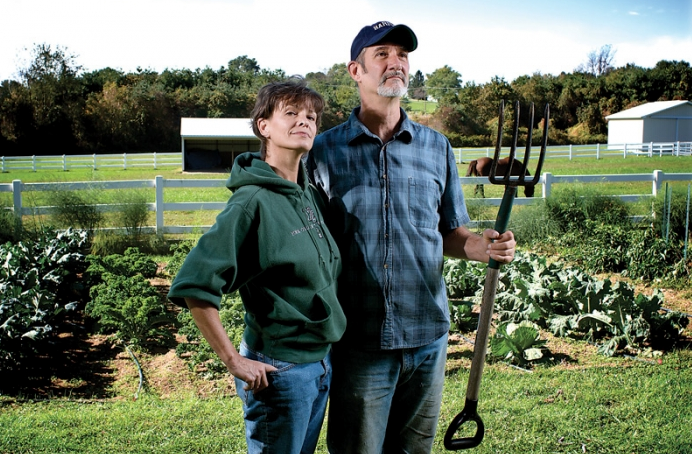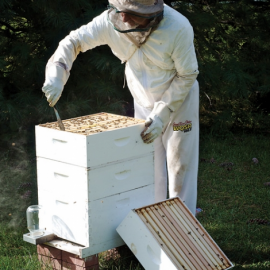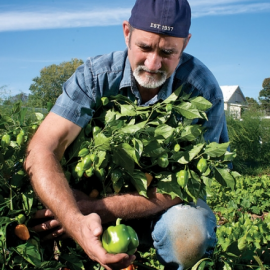Food & Drink
Green Acres
These days, radio personality Steve Rouse makes a pitch for fresh produce grown on his farm.
Back in the heyday of his top-rated WQSR radio show, Rouse and Co., Steve Rouse once rode his mower from Hunt Valley to the show’s studios in Towson, cutting grass along the way, for one of his more memorable bits. “Allegedly, I drove my lawnmower from my house in Fallston to the station,” says the 59-year-old Rouse, “but I fully admit now that I started in Hunt Valley, where the sidewalk began.”
That ride may have been an indicator of his future. These days, Rouse, who works part time doing freelance voice work for WBAL-FM, 98 Rock, and other outlets, can most often be found on his six-acre Fallston farm tooling around on his blue 1967 Ford 3000 tractor (lovingly nicknamed “Hank”) while tending to 150 chickens, thousands of bees, and fields of some 40 varieties of fruits and vegetables—from turnips, strawberries, and radishes to Swiss chard, clover, and sweet corn. “Nothing makes me happier than spending a day on Hank,” Rouse says.
While he has maintained a chicken coop and small fruit and vegetable beds on this property for many years, Rouse and live-in love Vicky Murdock officially turned the property into a Community Supported Agriculture farm (CSA) in 2009, farming fresh produce for area families from June through October. (While the farm has not yet received organic certification, Rouse and Murdock practice organic farming and use no chemicals in their gardening.)
Radio Rouse admits that people are often surprised that he is Farmer Steve. “They don’t picture me as part of something like this,” he says. “To them, I have always been this radio guy, but I had the 98 Rock morning show crew here for lunch, and they thought it was cool.” For the record, the menu included mixed greens from the garden and grilled chicken breasts from Rouse’s own farm-raised chickens.
Mickey Cucchiella of the 98 Rock team says with a laugh, “Steve will one day look back at his life and think, ‘Wow, I did it—took an unbelievable career and threw it away on farming.'”
Jokes aside, Rouse—a self-professed child of the ’60s—has always had a passion for farming. Whether residing in Maine or Virginia, he has attempted to cultivate the land. In the ’80s, while living on a 50-acre farm in upstate New York, Rouse kept a vegetable garden, chickens, pigs, cattle, and bees. “At that time, my goal was self-sufficiency,” says Rouse. “I didn’t want to depend on anyone for anything. I was angry about the food situation with people spraying poisons on the food—that rubbed me the wrong way, and that has always been something that was a concern for me.”
When Rouse retired from radio full time in 2007, he contemplated the next chapter of his life. “I started thinking about farming and then decided to kick it up a notch,” he says.
After an interview with Joan Norman of One Straw Farm (the largest CSA in Maryland) for his WMAR-ABC2 show Maryland Living and after taking a small-farm basics class offered at another area farm, he was convinced that a CSA was the way to go. “The minute we decided we were going to do this, it seemed like it was everywhere,” Rouse says.
Last summer, Rouse and Murdock found five area families who were interested in joining their CSA. During the growing season, the families paid a cut-rate $10 a week (most CSAs charge between $20 and $25 a week) in exchange for an artfully arranged basket of enough homegrown fruits, vegetables, and other farm products (including eggs, honey, and, occasionally, chicken) to feed a family of four for a week. “We call them our guinea pig families since this is our first attempt at doing this,” says Murdock, a tall, slender brunette.
Initially, Rouse didn’t want to charge anything since he considered the project a learning experience. But “everyone said to me, ‘No, you have to get something for your labor,'” he says.
And, indeed, it is a labor of love, starting when Rouse and Murdock clean the chicken coop and feed the hens (plus the one male rooster nicknamed “The Falcon”) at 8 a.m. and continuing with an exhaustive list of chores like tilling, planting, picking, mowing, weeding, fertilizing, bee inspecting, and egg collecting that go on well into the evening until the duo settle down at midnight.
“This has worked out great for me,” says Rouse, who lost 25 pounds from farm work last summer. “There are some days I’m out here, and I’m like, ‘This is pretty much a perfect deal.’ I can spend all my time out here.”
On a glorious fall day, Rouse and Murdock proudly show a visitor Rousedale Farm, where elegant towers of deep green romaine and a bounty of beet leaves spring from the soil while delicate asparagus tree ferns sway in the distance. “Nothing goes to waste here,” says Murdock, as she shows off three water barrels in the backyard that collect rainwater, which, in turn, goes back to the chickens that peck at food scraps left over from the kitchen compost.
While the fields are dormant in the winter months, there are projects—including the installation of a wood-burning furnace and a “high tunnel,” a film-covered frame to extend the growing season—that keep them busy. A neighbor’s horses graze the field and produce manure that will be dumped over the fence into the wheelbarrow on Rouse’s property, which will then be tilled under to help make the soil richer.
Rouse’s favorite part of running a CSA is taking products to his customers. “I enjoy doing my deliveries,” he says. “I love the interaction with people and having a few laughs. I also enjoy answering questions. People will ask, ‘What’s this?’ and I’ll say, ‘A turnip.’ ‘Really,’ they’ll say, ‘I’ve never had a turnip.’ I love teaching them, and I also enjoy getting feedback.”
There are no complaints from subscriber Melanie Ruckle of Forest Hill, who joined a CSA for the first time. “The veggies we received were diverse, of the best quality, and fresh, fresh, fresh,” she says. “Knowing who grew our food and how much fun the grower had growing it added to the experience.”
She also enjoyed Rouse’s excitement each time he delivered a basket of goodies. “He is like a kid waiting for you to open a present,” Ruckle says. “He just loves it, and all of this [love] goes into that meal you cook.”
Ironically, Rouse and Murdock’s relationship grew out of gardening. The two became acquainted in 1994, and then, in 2003, when Rouse needed a project manager for a pilot he was shooting called Down on the Farm, he hired Murdock (who was formerly in finance) for the job. “I wanted to do a show because I said no one knows where their food comes from anymore,” he says. The pilot never took off, but their romance did.
These days, the kindred spirits toil in the soil. He does the heavy lifting. She is the planner, “project manager,” and basket stuffer. And whether they are planting blueberries in the snow or experiencing growing pains (like when the tomato crop didn’t take), they enjoy working together. “Getting down on your knees and having your hands in the dirt, you are providing for your own existence,” says Murdock. “You can’t get any more real that that.”
For Rouse, who has five children ages 18 through 39, educating people about the results is important. “I’m not trying to change anyone’s mind about organic vs. inorganic, but if someone asks me a question, I will tell them what I think,” he says. “For me, the bottom line is, ‘Do you want poison sprayed on your food or don’t you?'”
Both Rouse and Murdock are incredulous that their gardening dreams have come true. In the beginning, the couple would get panicky each Wednesday before the Thursday delivery, wondering if they would have enough produce. “It has been amazing to us that we have been able to supply this stuff every week since June 1,” Rouse says.
They hope to spark even more Mary-landers to grow local. “If we could do this, anyone can do this,” says Murdock. “It’s as easy as putting seeds into the ground and watering them. If you do that, you will always get something.”
Don’t look for Rouse to go back to his other day job anytime soon. “We had our show,” says Rouse, “Had it not been such a success, I might have more of a burning desire, but I got to the top of the mountain, and I achieved what I wanted to achieve. I really like doing what I’m doing here.”



